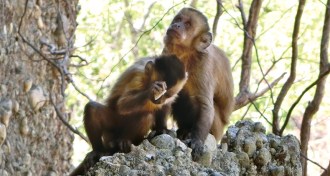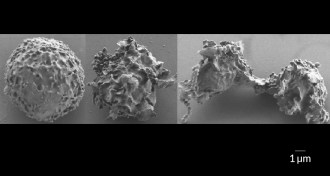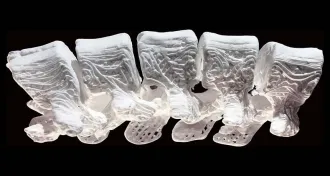Humans
Sign up for our newsletter
We summarize the week's scientific breakthroughs every Thursday.
-
 Genetics
GeneticsReaders question the biology of alcoholism and more
Alcoholism-linked genes, making better corneas and more in reader feedback.
-
 Archaeology
ArchaeologyWild monkeys throw curve at stone-tool making’s origins
Monkeys that make sharp-edged stones raise questions about evolution of stone tool production.
By Bruce Bower -
 Genetics
GeneticsBig biological datasets map life’s networks
Expanding from genomics to multi-omics means stretching data capacity, but it may lead to a future of early diagnosis, personalized medicine and hardy crops.
-
 Humans
HumansTom Wolfe’s denial of language evolution stumbles over his own words
Tom Wolfe’s book denies that language evolved and attacks Darwin and Chomsky with smugness lacking substance.
-
 Neuroscience
NeuroscienceOut-of-sync body clock causes more woes than sleepiness
The ailment, called circadian-time sickness, can be described with Bayesian math, scientists propose.
-
 Life
LifePlacenta protectors no match for toxic Strep B pigment
Strep B uses a toxic pigment made of fat to kill immune system cells, spurring preterm labor and dangerous infections, a monkey study shows.
-
 Health & Medicine
Health & MedicineBaby-led weaning is safe, if done right
Babies who fed themselves solid foods, called baby-led weaning, were no more likely to choke than spoon-fed babies, a new study finds.
-
 Psychology
PsychologyErasing stigma needed in mental health care
Social forces drive those in need away from mental health care.
By Bruce Bower -
 Materials Science
Materials ScienceSuperflexible, 3-D printed “bones” trigger new growth
New ultraflexible material could be the future of bone repair, but awaits human testing.
-
 Health & Medicine
Health & Medicine50 years ago, noise was a nuisance (it still is)
In 1966, scientists warned of the physical and psychological dangers of a louder world.
-
 Psychology
PsychologyChimps, other apes take mind reading to humanlike level
In a first, apes show that they understand when others hold false beliefs.
By Bruce Bower -
 Science & Society
Science & SocietySometimes failure is the springboard to success
Editor in chief Eva Emerson discusses scientific discoveries that resulted from failures large and small.
By Eva Emerson